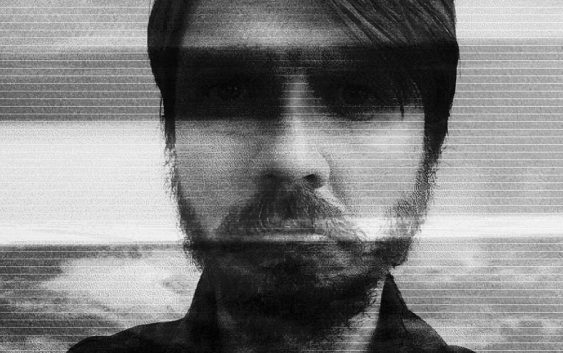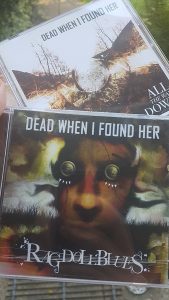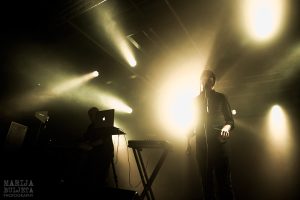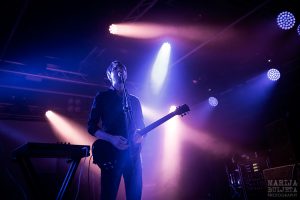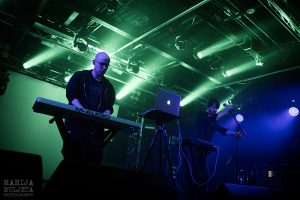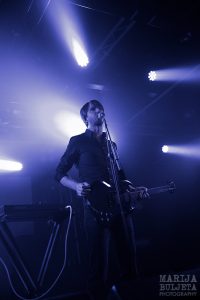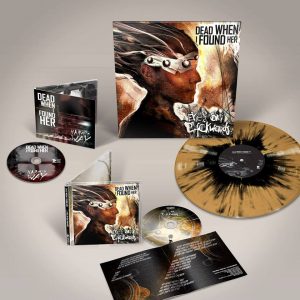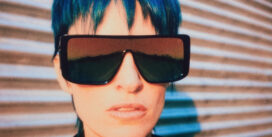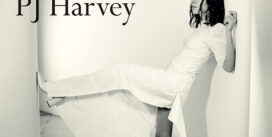The first time I got to hear and see Dead When I Found Her was at this year’s Infest Festival in Bradford, UK. I had no expectations whatsoever, but after just first three songs, I became aware of how exceptional this electronic industrial project was. Even though it was formed in 2010, there are already three albums and the fourth one is just about to be officially released in November. Today we are speaking to Michael Arthur Holloway about his work.
1. Hello Michael and thank you for joining us. The name of your project is quite intriguing. Can you tell us something about the name itself? What does it really mean, or what it means to you?
The name comes from a Tom Waits live show. He’s describing why he hates staying in Motels, and says “It’s always the same, the cops bust in the door and I’m sitting there saying ‘Officer, I swear, she was dead when I found her!’”
2. I was really blown away by your live performance at Infest this year. I was eager to find more about you. I found All The Way Down at the merch stand and bought it. However you advised me to get Rag Doll Blues from 2012, which is now a part of my collection as well. Can you tell me how you feel about both releases?
I don’t have a favorite, because each album has had a very distinct identity, both in terms of how it sounds once it’s done, but also the experience that I had making it. Rag Doll Blues is a bit more “traditional” as an album of industrial songs, and All The Way Down was conceived much more as a concept album, so I think the songs feel a lot more unified on it than those on RDB. There was a deliberate attempt with ATWD to create a theme and a mood and then explore it as fully as possible through all of the songs: it’s really an Album, as opposed to just being a collection of songs.
3. What music styles would you name as your inspiration? What particular genres or artists do you feel especially drawn to?
My all time favorite band is of course Skinny Puppy. After that, I listen to a wide range of music, including favorites like Bohren and Der Club of Gore, a German quartet who play slow noir-style jazz music. Other favorite bands include Coil, Boards of Canada, Tom Waits, The National, Nick Cave. I gravitate most strongly to electronic music, but I still enjoy a lot of guitar based music as well.
4. You use a lot of samples and cleverly integrate them into your own creations. How do you pick them? Can you reveal some sources?
Choosing the samples is as simple as watching a movie with my friends and going “oh man, that line would make such a great sample!” and then sampling it the next day. I watch a ton of horror movies and I’m particularly drawn to 70’s and 80’s films, so most of the sampled material comes from those eras. David Cronenberg and Stuart Gordon are favorites. The Brood, for example, was sampled extensively on both Rag Doll Blues and All The Way Down. I also like to sample very, very old black and white films. Some of the best samples are in Curtains, from Harm’s Way, which came from old Hammer horror movies that are actually a bit dull to watch all the way through, but have some great moments and dialog.
5. I read you were a movie fan. What genres inspire you the most?
I think my previous response probably answered this already; horror and noir are my favorites. From the latter, the more atmosphere, the better: Chinatown, The Big Heat, In A Lonely Place. I love the smokey black and white Los Angeles noir stories. I’m not even sure why that era and vibe appeals to me so much, but I connect very strongly with it.
6. I still haven’t had the opportunity to get the copy of your first release Harm’s Way from 2010. I am waiting patiently for it to be re-issued. How do you think you moved from the first release to the last one? I can even notice the change between Rag Doll Blues to the somewhat more down tempo and more atmospheric All The Way Down.
The re-release of Harm’s Way will be out in November, so it’s almost here, and includes some very early material as bonus tracks. When I wrote Harm’s Way, I was getting back into recording and songwriting after a long hiatus, so the album was very much a learning process. I bought Ableton Live and wrote all the songs with it while basically learning everything about the program. Considering that, I actually think it turned out pretty damn well. It also has the most guitar of any of the DWIFH albums, which is something I’d like to get back to with future releases.
7. I was surprised to hear from you that Infest was in fact the first time you played in Europe. How do you feel about that experience? Are you pleased with the reception from the European audience?
Infest was an amazing festival and a great event to be a part of—definitely a great first Euro show to have! The reception felt positive, though I noticed that the crowd—maybe it’s an English thing—didn’t move, dance or shout as much as American crowds tend to.
8. You also played in Chicago at Cold Waves festival. How was it? Can you compare those two last festivals which took place only a month apart on two different continents? Is there any difference playing back home and in Europe?
Cold Waves was another stellar festival, and the biggest show we’ve ever played. It was definitely my favorite of the festivals we did this year (Along with Terminus, we did three festivals in three months in three countries. It was an awesome summer).
9. What is the “alternative” or “underground” or “electronic-industrial” scene, or whatever you want to call it, like in USA?
I can’t really speak for the whole country, it’s much too big and I just live here in Portland! Our scene locally is very small, but dedicated. We have the Lovecraft, a goth-industrial themed bar with a pentagram on the ceiling and coffin you can take photos in. It sounds cheesy, I guess, but the vibe is actually dead-on and it’s a great place to hang out and hear the music of our scene.
I’d heard that Europe has more and better festivals than the US does, but after playing to a sold-out crowd at Cold Waves in Chicago, I’m convinced the US can draw a big crowd for industrial music as well.
10. Now back to your work. You are both the composer and the songwriter. What subjects do you focus on the most lyrically?
It’s different on each album, I try to choose a theme in advance that will, loosely at least, be the focus of the lyrical material for that project. With All The Way Down, it was very specifically about old age, the elderly, and death. But the other albums all have their recurring themes: Rag Doll Blues is about childhood and the fragility of memory, Harm’s Way has recurring themes about an unsolved crime and the futility of trying to find new clues to solve a mystery that is stuck in the past.
11. Are you involved in any other art projects apart from Dead When I Found Her?
Earlier this year I released a solo album, so to speak: it’s called Guilt Noir and was released under my full name, Michael Arthur Holloway. It’s available exclusively on band camp, and is an instrumental album of what I like to call Doom Jazz — somber, moody noir pieces, with very different instrumentation from DWIFH, it’s all Rhodes electric piano and trumpet and saxophone. It’s good music for late night walks in the rain.
I also do work for video game companies and other media, composing and producing soundtracks. It’s something I’m not very deep into yet, but I’m looking for more work in those areas. I have a website that I recently launched — www.thedarkestcorner.net — that is my personal business site for contracting soundtrack work for horror and other dark-themed media. Feel free to check it out, there are audio clips and samples from work I’ve done for previous clients, like the video game soundtrack to “Skullduggery!”, a mobile game in which you fling an animated skull around a cartoon world.
12. I haven’t heard Eyes On Backwards yet, so I have to ask you what we can expect from your latest album?
After the long and moody All The Way Down, I wanted to make a complementary album: something shorter, faster and angrier. For about half the album, that’s exactly what I did, but eventually my tendency toward mid-tempo, atmospheric tracks won out again, and half the album is a more melodic, less aggressive approach to industrial. But it’s a nice mix, you get a harsh new sound but also the familiar melodic side of the band as well.
13. Any possible dates when can we expect to see you in Europe again?
Nothing is currently booked, but I’d love bring DWIFH back to Europe, so I certainly hope the future will bring some new opportunities for travel!


